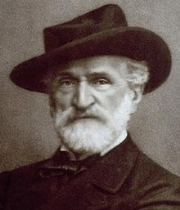Giuseppe Verdi
Giuseppe Fortunino Francesco Verdi (9 or 10 October 1813 – 27 January 1901) was an Italian composer best known for his operas. He was born near Busseto, a small town in the province of Parma, to a family of moderate means, receiving a musical education with the help of a local patron, Antonio Barezzi. Verdi came to dominate the Italian opera scene after the era of Gioachino Rossini, Vincenzo Bellini, and Gaetano Donizetti, whose works significantly influenced him.
In his early operas, Verdi demonstrated sympathy with the Risorgimento movement which sought the unification of Italy. He also served briefly as an elected politician. The chorus "Va, pensiero" from his early opera Nabucco (1842), and similar choruses in later operas, were much in the spirit of the unification movement, and the composer himself became esteemed as a representative of these ideals. An intensely private person, Verdi did not seek to ingratiate himself with popular movements. As he became professionally successful, he was able to reduce his operatic workload and sought to establish himself as a landowner in his native region. He found further fame with the three peaks of his 'middle period': Rigoletto (1851), Il trovatore and La traviata (both 1853). He surprised the musical world by returning, after his success with the opera Aida (1871), with three late masterpieces: his Requiem (1874), and the operas Otello (1887) and Falstaff (1893).
In his last years, Verdi undertook a number of philanthropic ventures, publishing in 1894 a song for the benefit of earthquake victims in Sicily, and from 1895 onwards planning, building and endowing a rest-home for retired musicians in Milan, the Casa di Riposo per Musicisti, and building a hospital at Villanova sull'Arda, close to Busseto. His last major composition, the choral set of Four sacred pieces, was published in 1898. In 1900 he was deeply upset at the assassination of King Umberto and sketched a setting of a poem in his memory, but was unable to complete it.
While staying at the Grand Hotel, Verdi suffered a stroke on 21 January 1901. He gradually grew more feeble over the next week, during which Stolz cared for him, and died on 27 January at the age of 87.
Verdi was initially buried in a private ceremony at Milan's Cimitero Monumentale. A month later, his body was moved to the crypt of the Casa di Riposo.














 My Wish List
My Wish List















